Selected from The Complete Works of Swami Vivekananda Vol.5, ‘The East and the West’
With us, the prominent idea is Mukti; with the Westerners, it is Dharma. What we desire is Mukti; what they want is Dharma. Here the word ‘Dharma’ is used in the sense of the Mimamsakas.
What is Dharma? Dharma is that which makes man seek for happiness in this world or the next. Dharma is established on work; Dharma is impelling man day and night to run after and work for happiness.
What is Mukti? That which teaches that even the happiness of this life is slavery, and the same is the happiness of the life to come, because neither this world nor the next is beyond the laws of nature; only, the slavery of this world is to that of the next as an iron chain is to a golden one. Again, happiness, wherever it may be, being within the laws of nature, is subject to death and will not last ad infinitum. Therefore man must aspire to become Mukta, he must go beyond the bondage of the body; slavery will not do. This Moksha-path is only in India and nowhere else. Hence is true the oftrepeated saying that Mukta souls are only in India and in no other country. But it is equally true that in future they will be in other countries as well; that is well and good, and a thing of great pleasure to us. There was a time in India when Dharma was compatible with Mukti. There were worshippers of Dharma, such as Yudhishthira, Arjuna, Duryodhana, Bhishma, and Karna, side by side with the aspirants of Mukti, such as Vyasa, Shuka, and Janaka. On the advent of Buddhism, Dharma was entirely neglected, and the path of Moksha alone became predominant…. The central fact is that the fall of our country, of which we hear so much spoken, is due to the utter want of this Dharma. If the whole nation practises and follows the path of Moksha, that is well and good; but is that possible? Without enjoyment, renunciation can never come; first enjoy and then you can renounce. Otherwise, if the whole nation, all of a sudden, takes up Sannyasa, it does not gain what it desires, but it loses what it had into the bargain—the bird in the hand is fled, nor is that in the bush caught. When, in the heyday of Buddhistic supremacy, thousands of Sannyasins lived in every monastery, then it was that the country was just on the verge of its ruin! . . . education, habits, customs, laws, and rules should be different for different men and nations, in conformity with their difference of temperament. What will it avail, if one tries to make them all uniform by compulsion? The Bauddhas declared, ‘Nothing is more desirable in life than Moksha; whoever you are, come one and all to take it.’ I ask, ‘Is that ever possible?’ ‘You are a householder, you must not concern yourself much with things of that sort; you do your Svadharma (natural duty)’—thus say the Hindu scriptures. Exactly so! He who cannot leap one foot, is going to jump across the ocean to Lanka in one bound! Is it reason? You cannot feed your own family or dole out food to two of your fellow-men, you cannot do even an ordinary piece of work for the common good, in harmony with others— and you are running after Mukti! The Hindu scriptures say, ‘No doubt, Moksha is far superior to Dharma; but Dharma should be finished first of all.’ The Bauddhas were confounded just there and brought about all sorts of mischief. Non-injury is right; ‘Resist not evil’ is a great thing—these are indeed grand principles; but the scriptures say, ‘Thou art a householder; if anyone smites thee on thy cheek, and thou dost not return him an eye for an eye, a tooth for a tooth, thou wilt verily be a sinner.’ Many say, ‘When one has come to kill you, there is no sin in killing him, even though he be a Brahmin’ (Manu, VIII. 350). This is very true, and this is a thing which should not be forgotten. Heroes only enjoy the world. Show your heroism; apply, according to circumstances, the fourfold political maxims of conciliation, bribery, sowing dissensions, and open war, to win over your adversary and enjoy the world—then you will be Dharmika (righteous). Otherwise, you live a disgraceful life if you pocket your insults when you are kicked and trodden down by anyone who takes it into his head to do so; your life is a veritable hell here, and so is the life hereafter. This is what the Shastras say. Do your Svadharma— this is truth, the truth of truths. This is my advice to you, my beloved co-religionists. Of course, do not do any wrong, do not injure or tyrannise over anyone, but try to do good to others as much as you can. But passively to submit to wrong done by others is a sin—with the householder. He must try to pay them back in their own coin then and there. The householder must earn money with great effort and enthusiasm, and by that must support and bring comforts to his own family and to others, and perform good works as far as possible. If you cannot do that, how do you profess to be a man? You are not a householder even—what to talk of Moksha for you!!
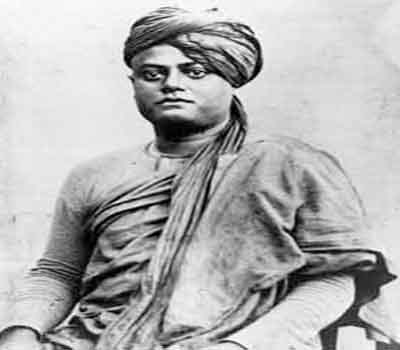
We have said before that Dharma is based on work. The nature of the Dharmika is constant performance of action with efficiency. Why, even the opinion of some Mimamsakas is that those parts of the Vedas which do not enjoin work are not, properly speaking, Vedas at all. One of the aphorisms of Jaimini runs thus: आम्नायस्य क्रियार्थत्वादानर्थक्यमतदर्थानाम्—‘The purpose of the Vedas being work, those parts of the Vedas that do not deal with work miss the mark.’
‘By constant repetition of the syllable Om and by meditating on its meaning, everything can be obtained’; ‘All sins are washed away by uttering the name of the Lord’; ‘He gets all, who resigns himself to the Will of God’—yes, these words of the Shastras and the sages are, no doubt, true. But, do you see, thousands of us are, for our whole life, meditating on Om, are getting ecstatic in devotion in the name of the Lord, and are crying, ‘Thy Will be done, I am fully resigned to Thee!’—and what are they actually getting in return? Absolutely nothing! How do you account for this? The reason lies here, and it must be fully understood. Whose meditation is real and effective? Who can really resign himself to the Will of God? Who can utter with power irresistible, like that of a thunderbolt, the name of the Lord? It is he who has earned Chitta-shuddhi, that is, whose mind has been purified by work, or in other words, he who is the Dharmika.
Every individual is a centre for the manifestation of a certain force. This force has been stored up as the resultant of our previous works, and each one of us is born with this force at his back. So long as this force has not worked itself out, who can possibly remain quiet and give up work? Until then, he will have to enjoy or suffer according to the fruition of his good or bad work and will be irresistibly impelled to do work. Since enjoyment and work cannot be given up till then, is it not better to do good rather than bad works—to enjoy happiness rather than suffer misery? Shri Ramprasad [a Bengali saint, devotee of Kali] used to say, ‘They speak of two works, “good” and “bad”; of them, it is better to do the good.’
Now what is that good which is to be pursued? The good for him who desires Moksha is one, and the good for him who wants Dharma is another. This is the great truth which the Lord Shri Krishna, the revealer of the Gita, has tried therein to explain, and upon this great truth is established the Varnashrama system and the doctrine of Svadharma etc. of the Hindu religion.
अद्वेष्टा सर्वभूतानां मैत्रः करुण एव च।
निर्ममो निरहङ्कारः समदुःखसुखः क्षमी ।। (Gita, 12:13)
‘He who has no enemy, and is friendly and compassionate towards all, who is free from the feelings of ‘me and mine’, even-minded in pain and pleasure, and forbearing’ — these and other epithets of like nature are for him whose one goal in life is Moksha.
क्लैब्यं मास्म गमः पार्थ नैतत्त्वय्युपपद्यते।
क्षुद्रं हृदयदौर्बल्यं त्यक्त्वोत्तिष्ठ परन्तप (Gita, 2:3)
‘Yield not to unmanliness, O son of Pritha! Ill doth it befit thee. Cast off this mean faintheartedness and arise, O scorcher of thine enemies.’
तस्मात्त्वमुत्तिष्ठ यशो लभस्व
जित्वा शत्रून् भुङ्क्ष्व राज्यं समृद्धम्।
मयैवैतेनिहताः पूर्वमेव
निमित्तमात्रं भव सव्यसाचिन् ।। (Gita,11:33)
‘Therefore do thou arise and acquire fame. After conquering thy enemies, enjoy unrivalled dominion; verily, by Myself have they been already slain; be thou merely the instrument, O Savyasachin (Arjuna).’
In these and similar passages in the Gita the Lord is showing the way to Dharma. Of course, work is always mixed with good and evil, and to work, one has to incur sin, more or less. But what of that? Let it be so. Is not something better than nothing? Is not insufficient food better than going without any? Is not doing work, though mixed with good and evil, better than doing nothing and passing an idle and inactive life, and being like stones? The cow never tells a lie, and the stone never steals, but, nevertheless, the cow remains a cow and the stone a stone. Man steals and man tells lies, and again it is man that becomes a god. With the prevalence of the Sattvika essence, man becomes inactive and rests always in a state of deep Dhyana or contemplation; with the prevalence of the Rajas, he does bad as well as good works; and with the prevalence of the Tamas again, he becomes inactive and inert. Now, tell me, looking from outside, how are we to understand, whether you are in a state wherein the Sattva or the Tamas prevails? Whether we are in a state of Sattvika calmness, beyond all pleasure and pain, and past all work and activity, or whether we are in the lowest Tamasika state, lifeless, passive, dull as dead matter, and doing no work, because there is no power in us to do it, and are, thus, silently and by degrees, getting rotten and corrupted within—I seriously ask you this question and demand an answer. Ask your own mind, and you shall know what the reality is. But, what need to wait for the answer? The tree is known by its fruit. The Sattva prevailing, the man is inactive, he is calm, to be sure; but that inactivity is the outcome of the centralisation of great powers, that calmness is the mother of tremendous energy. That highly Sattvika man, that great soul, has no longer to work as we do with hands and feet—by his mere willing only, all his works are immediately accomplished to perfection. That man of predominating Sattva is the Brahmin, the worshipped of all. Has he to go about from door to door, begging others to worship him? The Almighty Mother of the universe writes with Her own hand, in golden letters on his forehead, ‘Worship ye all, this great one, this son of Mine’, and the world reads and listens to it and humbly bows down its head before him in obedience. That man is really अद्वेष्टा सर्वभूतानां मैत्रः करुण एव च etc.
And mark you, those things which you see in pusillanimous, effeminate folk who speak in a nasal tone chewing every syllable, whose voice is as thin as of one who has been starving for a week, who are like a tattered wet rag, who never protest or are moved even if kicked by anybody—those are the signs of the lowest Tamas, those are the signs of death, not of Sattva—all corruption and stench. It is because Arjuna was going to fall into the ranks of these men that the Lord is explaining matters to him so elaborately in the Gita. Is that not the fact? Listen to the very first words that came out of the mouth of the Lord, क्लैब्यं मास्म गमः पार्थ नैतत्त्वय्युपपद्यते—‘Yield not to unmanliness, O Partha! Ill doth it befit thee!’ and then later, तस्मात्त्वमुत्तिष्ठ यशो लभस्व — ‘Therefore do thou arise and acquire fame.’ Coming under the influence of the Jains, Buddhas, and others, we have joined the lines of those Tamasika people.
During these last thousand years, the whole country is filling the air with the name of the Lord and is sending its prayers to Him; and the Lord is never lending His ears to them. And why should He? When even man never hears the cries of the fool, do you think God will? Now the only way out is to listen to the words of the Lord in the Gita, क्लैब्यं मास्म गमः पार्थ—‘Yield not to unmanliness, O Partha!’ तस्मात्त्वमुत्तिष्ठ यशो लभस्व ‘Therefore do thou arise and acquire fame.’
…Jesus Christ, the God of the Europeans, has taught: Have no enemy, bless them that curse you; whosoever shall smite thee on thy right cheek, turn to him the other also; stop all your work and be ready for the next world; the end of the world is near at hand. And our Lord in the Gita is saying: Always work with great enthusiasm, destroy your enemies and enjoy the world. But, after all, it turned out to be exactly the reverse of what Christ or Krishna implied. The Europeans never took the words of Jesus Christ seriously. Always of active habits, being possessed of a tremendous Rajasika nature, they are gathering with great enterprise and youthful ardour the comforts and luxuries of the different countries of the world and enjoying them to their hearts’ content. And we are sitting in a corner, with our bag and baggage, pondering on death day and night, and singing, नलिनीदलगतजलमतितरलं तद्वज्जीवनमतिशयचपलम् ‘Very tremulous and unsteady is the water on the lotus-leaf; so is the life of man frail and transient’—with the result that it is making our blood run cold and our flesh creep with the fear of Yama, the god of death; and Yama, too, alas, has taken us at our word, as it were—plague and all sorts of maladies have entered into our country! Who are following the teachings of the Gita?—the Europeans. And who are acting according to the will of Jesus Christ?— The descendants of Shri Krishna! This must be well understood. The Vedas were the first to find and proclaim the way to Moksha, and from that one source, the Vedas, was taken whatever any great Teacher, say, Buddha or Christ, afterwards taught. Now, they were Sannyasins, and therefore they ‘had no enemy and were friendly and compassionate towards all’. That was well and good for them. But why this attempt to compel the whole world to follow the same path to Moksha? ‘Can beauty be manufactured by rubbing and scrubbing? Can anybody’s love be won by threats or force?’ What does Buddha or Christ prescribe for the man who neither wants Moksha nor is fit to receive it?—Nothing! Either you must have Moksha or you are doomed to destruction—these are the only two ways held forth by them, and there is no middle course. You are tied hand and foot in the matter of trying for anything other than Moksha. There is no way shown how you may enjoy the world a little for a time; not only all openings to that are hermetically sealed to you, but, in addition, there are obstructions put at every step. It is only the Vedic religion which considers ways and means and lays down rules for the fourfold attainment of man, comprising Dharma, Artha, Kama, and Moksha. Buddha ruined us, and so did Christ ruin Greece and Rome! Then, in due course of time, fortunately, the Europeans became Protestants, shook off the teachings of Christ as represented by Papal authority, and heaved a sigh of relief. In India, Kumarila again brought into currency the Karma-Marga, the way of Karma only, and Shankara and Ramanuja firmly re-established the Eternal Vedic religion, harmonising and balancing in due proportions Dharma, Artha, Kama, and Moksha. Thus the nation was brought to the way of regaining its lost life; but India has three hundred million souls to wake, and hence the delay. To revive three hundred millions—can it be done in a day?
‘This is the question: Is not your husband God, your child God? If you can love your wife, you have all the religion in the world. You have the whole secret of religion and Yoga in you. But can you love? That is the question. You say, “I love . . . Oh Mary, I die for you! “ [But if you] see Mary kissing another man, you want to cut his throat. If Mary sees John talking to another girl, she cannot sleep at night, and she makes life hell for John. This is not love. This is barter and sale in sex. It is blasphemy to talk of it as love. The world talks day and night of God and religion — so of love. Making a sham of everything, that is what you are doing! Everybody talks of love, [yet in the] columns in the newspapers [we read] of divorces every day. When you love John, do you love John for his sake or for your sake? [If you love him for your sake], you expect something from John. [If you love him for his sake], you do not want anything from John. He can do anything he likes, [and] you [will] love him just the same.’
—The Complete Works of Swami Vivekananda. Vol. 6 – Divine Love
Source : Vedanta Kesari, December, 2019


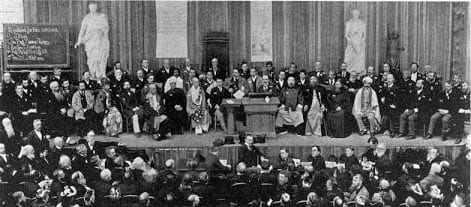
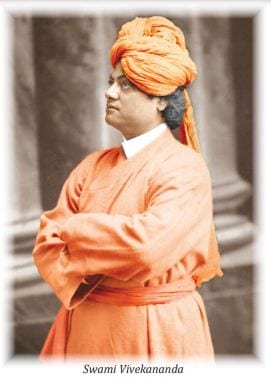
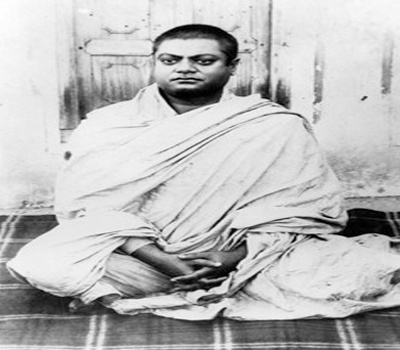

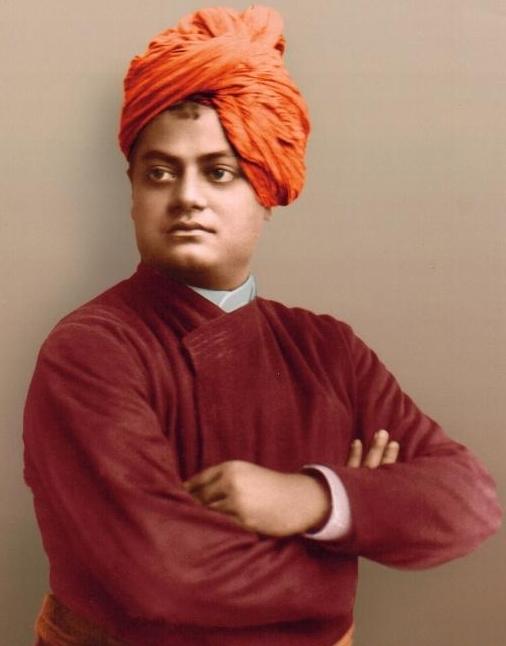
Leave A Comment